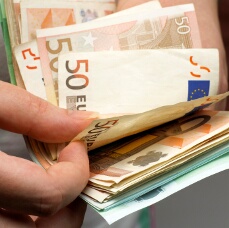
The euro today rallied higher against the US dollar from the Asian session into the early European session on hopes that the Italian government would amend its budget plans. The EUR/USD currency pair later headed lower after the German IFO business survey data missed expectations and Mario Draghi‘s speech had no new insights.
The EUR/USD currency pair today rallied from a low of 1.1325 in the Asian session to a high of 1.1384 in the European session before heading lower.
The currency pair begun rallying higher shortly after the start of today’s session as investors priced-in the likelihood of Italy’s government making budget concessions. Comments by Italy’s Deputy Prime Minister Matteo Salvini suggested that the country was willing to reduce its budget deficit to end the standoff. This was the result of a weekend meeting between Italian PM Giuseppe Conte and European Commission President Jean-Claude Juncker. The release of the German IFO business climate index in the early European session triggered the pair’s decline as the prints missed expectations. The IFO business climate print came in at 102.0 missing expectations by 0.3, while the IFO expectations print was recorded at 98.7 missing consensus estimates by 0.6.
Speeches from several members of the European Central Bank‘s Governing Council including the ECB President Mario Draghi had a muted impact on the currency pair as it continued falling.
The currency pair’s future performance is likely to be influenced by Italian budget developments and tomorrow’s German retail sales data.
The EUR/USD currency pair was trading at 1.1335 having retraced all of today’s gains by dropping from a high of 1.1384. The EUR/JPY currency pair was trading at 128.74 having risen from a low of 127.99.
If you have any questions, comments or opinions regarding the Euro,
feel free to post them using the commentary form below.